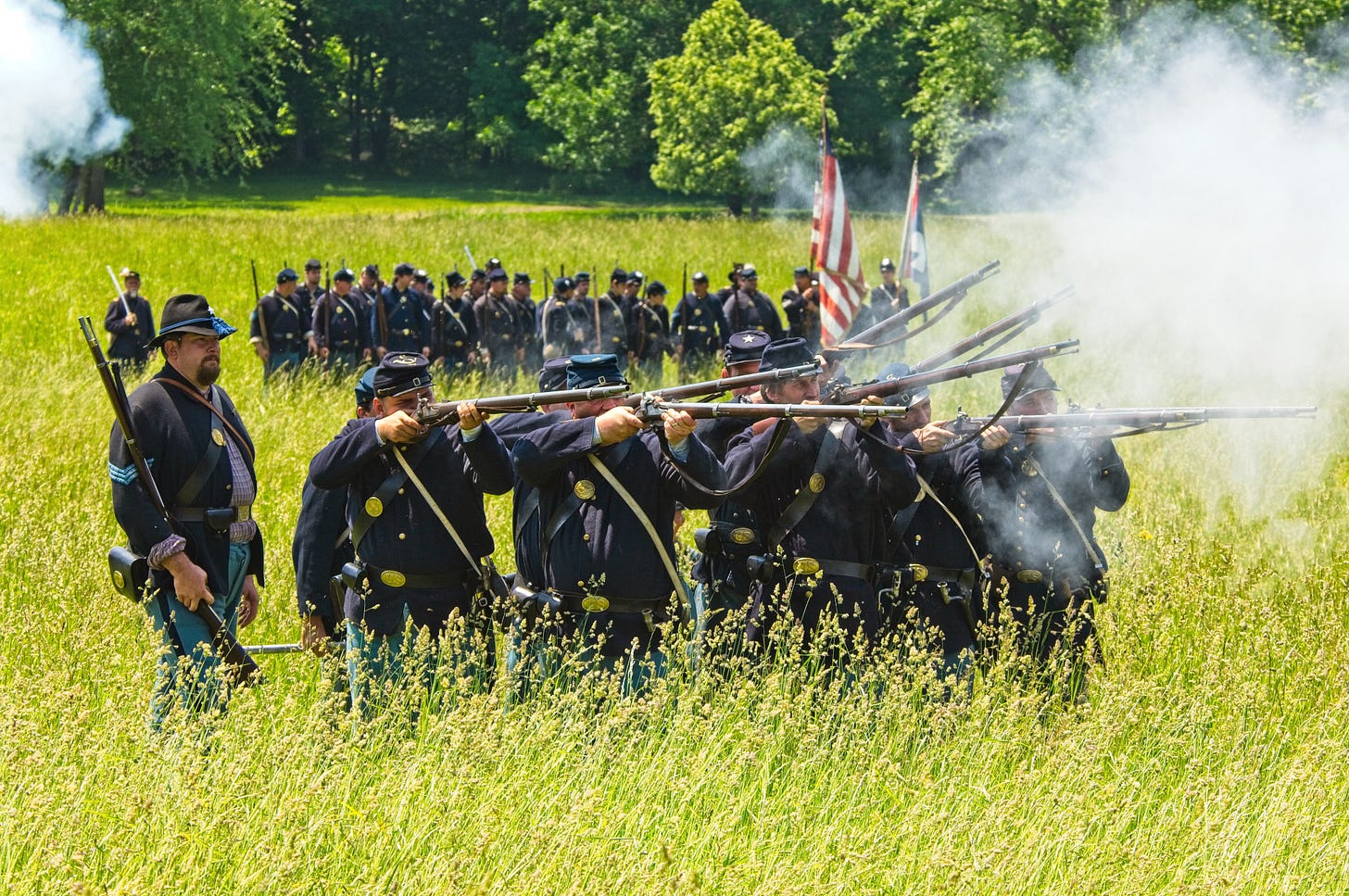At the end of the year, Thomas Homer-Dixon wrote for Canada’s Globe and Mail that his country should prepare for a United States civil war and the collapse of American democracy. A new book by Stephen Marche called The Next Civil War imagines just such events. Since nothing lasts forever, it seems reasonable to imagine a fractured U.S. succumbing to violent division.
Middlebrow’s interest here isn’t so much about whose fault this hypothetical civil war will be, but about how the notion of an impending violent schism is being used to win attention and dollars. There’s always a market for declinism (the United States as Rome) and for catastrophic fantasy. As with all things that resonate, the notion of American civil war does speak to real schisms and divisions in our society. It feels possible, but it really isn’t.
The U.S. is inflexible in the face of its problems. As the population has grown and urbanized the senate becomes less representative of the beliefs and attitudes of the national population. This is a feature of the system, meant to guard against a tyranny of the majority, but it has gone too far. The House is also less representative because state legislatures have manipulated districts to favor their party. The electoral college privileges more sparsely populated regions in presidential elections, undermining “one person, one vote.” In Middlebrow’s lifetime, Bill Clinton, George W. Bush and Donald Trump occupied the White House for a combined 20 years, without winning more than 50% of voter support (Clinton won a plurality of support in two three-way races while Bush lost the popular vote in 2000 and Trump lost it in 2016 and 2020).
Much of this can only be changed by amending the Constitution, which is impossible given the partisan divisions between the legislators and governors empowered to make such changes.
If the Constitution is calcified, the government and people divided, and representative democracy warped so that it no longer reflects the preferences of the population, civil war seems a plausible result. But it really isn’t. The notion of a hot civil war in the United States is anachronistic. With apologies to Sinclair Lewis, it can’t happen here.
The primary deterrent is the federal military, intelligence and law enforcement. In the 19th century, the U.S. organized its army through the states. Some remanants of this remain in state National Guards that work with governors, but the military might of the U.S. is federal now and even the National Guard has national in the name. Federal consolidation of military power is a huge practical deterrent to any sort of civil war as commonly understood.
Aside from federal organization, we have to consider the sheer power of military, intelligence and law enforcement in 2022. Without discounting the dangers of domestic terrorism to the population, the system of government is capable of not only defending itself but of thwarting plots.
Which brings up another factor — large corporations. People who believe in the possibility of war may cite the internet as a potential organizing tool. But the government is deeply integrated into the internet and into the companies that run on it. While social media did play a (perhaps exagerated) role in the Arab Spring protests, that was a decade ago and governments worldwide have since partnered with social platforms and communications networks to at least know monitor such organizing efforts, if not to quash them. Don’t even imagine that the block chain, crypto or What’sApp aren’t open books to a curious FBI and a compliant FISA court system.
Finally, there’s general political disinterest. If the U.S. can get close to 60% of eligible voters to show up for a presidential election, modern records are broken. People who can’t be bothered to stand on line and vote in an elementary school cafeteria are not going to risk freedom or bodily harm in a revolionary act.
The Middlebrow acknowledges that divisions in the U.S. run deeply, but those who would indulge in violence because of it live on the fringes, as they have since the post World War II era. People once thought the Symbionese Liberation Army, the Black Panthers or the Weather Underground could spark revolutions. Charles Manson thought society was so on the brink that it could be tricked over the edge and into a race war. Then, we had the right wing militia movements of the 1990s, which continue today.
There are people out there who will fight and kill over these issues, but the majority of the country lives independently of the antifa-fa spectrum. The idea of a civil war in the U.S. is a marketing program to sell books, podcasts, Substacks and personal appearances.
By all means be concerned about democracy. Any revolution will not be televised. It exists behind the scenes, mostly in state legisltures, where lower level elected representatives decide who can vote and how. It plays out in federal courts where decisions that will likely never see Supreme Court review are made.


